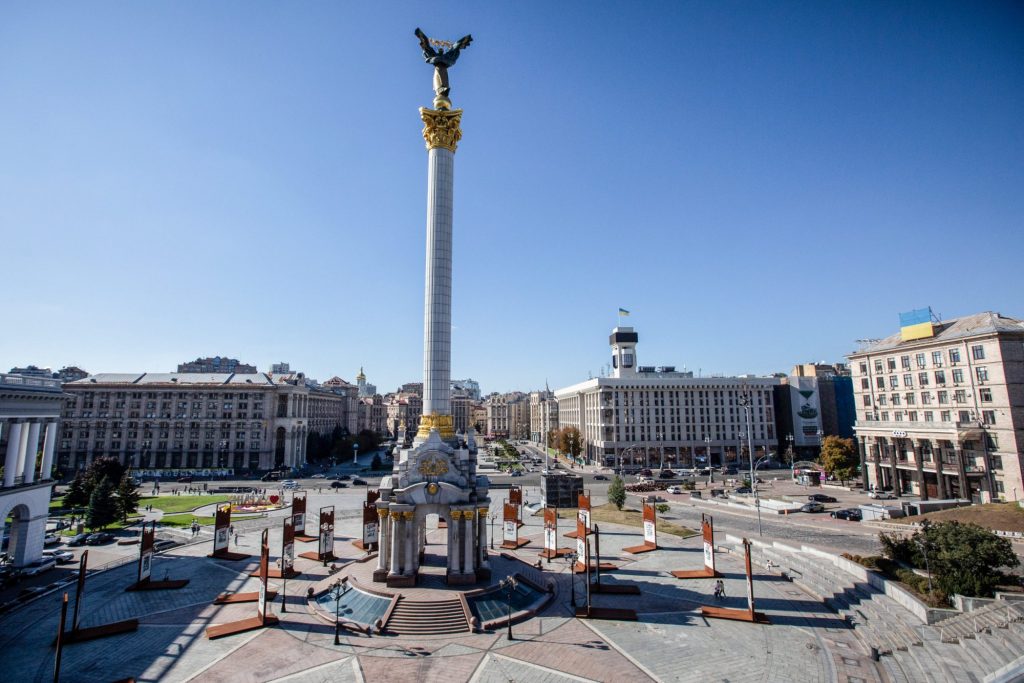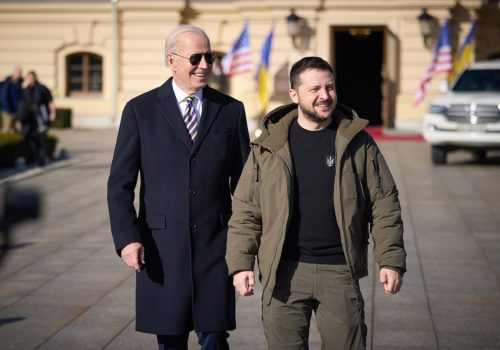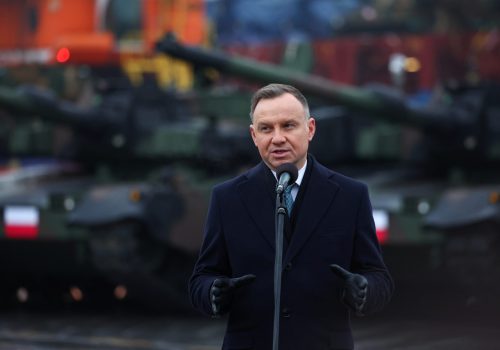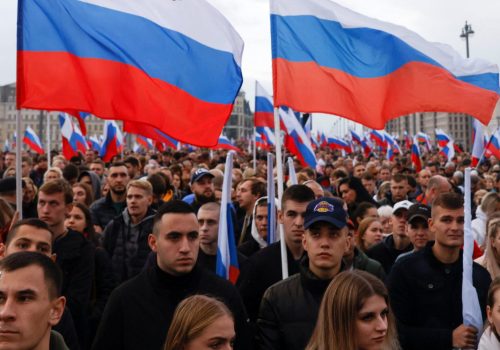As Russia’s full-scale invasion enters its second year, Ukraine remains unconquered. Russian President Vladimir Putin dreamed of seizing Kyiv in three days and imposing a puppet regime of pro-Kremlin political has-beens with zero legitimacy inside the country. Instead, Ukrainian society has remained defiant and is now more united than at any point in the past three decades of independence. Polls consistently indicate that today’s Ukraine is firmly committed to a democratic future within Europe secured by transatlantic security partnerships.
Ukraine’s pivot toward Western institutions built around democracy, freedom, and transparency is hugely significant. The importance of this shift lies not only in the top line figures showing that an overwhelming 80% of the country supports joining the European Union, but also in the strength of this support across all Ukrainian regions and among every demographic.
Prior to Russia’s full-scale invasion of Ukraine, there were several issues on the national agenda that divided Ukrainian public opinion. These divides were often visible along regional lines. The most contentious topics reflected differing Ukrainian attitudes toward the country’s future geopolitical direction. After more than twelve months of brutal warfare, that is no longer the case.
As has been pointed out hundreds of times over the past year, nobody is more personally responsible for the dramatic recent shifts in Ukrainian public opinion than Vladimir Putin and his backfiring policies of aggression. However, Ukraine’s turn toward the Western world is also part of a broader nation-building journey that has been underway since the country first regained independence from the collapsing Soviet Union in 1991.
Stay updated
As the world watches the Russian invasion of Ukraine unfold, UkraineAlert delivers the best Atlantic Council expert insight and analysis on Ukraine twice a week directly to your inbox.
Prior to last year’s full-scale Russian invasion, Ukraine had underlined its growing sense of Western identity by repeatedly demonstrating a readiness to make meaningful contributions to both the European Union and NATO.
In April 2020, Ukraine showed solidarity with the European Union by announcing that the country would match the expansion of EU sanctions on the Syrian regime of Bashar al-Assad. EU foreign policy chief Josep Borrell noted that by aligning its international approach on Syria, Ukraine had agreed to “ensure that their national policies conform” to the EU’s own position.
When the global spread of Covid-19 disrupted supply chains of personal protective equipment in 2020, Ukraine deployed its unique fleet of heavy-lift aircraft to unblock aid to the world. Ukraine’s Antonov-225 “Mriya” (“Dream’) was the largest plane of its kind in the world. It was soon making a series of medical supply runs to support neighboring Poland in the fight against the pandemic. Sadly, Russian forces destroyed the Mriya as they assaulted Hostomel Airport outside Kyiv during the early days of the invasion.
In addition to the Mriya, Ukraine also deployed its indispensable An-125 Ruslan heavy-lift cargo planes to support the NATO Strategic Air Lift Interim Solutions (SALIS) Program. NATO utilized the SALIS program to deliver medical equipment and supplies to member states during the pandemic.
In August 2021, as the US-led international presence in Afghanistan began to withdraw, the world watched chaotic scenes as thousands tried to flee Hamid Karzai International Airport. During this disastrous withdrawal, Ukrainian Special Forces troops landed in Kabul and went beyond the protective cordon surrounding the airport to rescue Afghan translators who had worked for the Canadian military. Those evacuated and others associated with the operation would later recount the heroism and professionalism of their Ukrainian rescuers. The Ukrainian military made dozens of additional rescue runs, eventually evacuating close to 700 Afghans and others.
At the time of these Kabul heroics, Ukrainian Foreign Minister Dmytro Kuleba commented: “In these horrific circumstances, our military officers demonstrated bravery and exemplary professionalism.” After a year of Ukrainian resistance against Russian aggression, those words now seem particularly prophetic.
Eurasia Center events

The events of the past year have radically altered international perceptions of Ukraine and helped to counter negative stereotypes that had earlier led many to doubt the country’s ability to withstand Russia’s military might. At the same time, the success of Ukraine’s nationwide resistance has not taken everyone by surprise. Indeed, many of the most striking aspects of Ukraine’s remarkable response to Russian aggression reflect trends that had long been evident to perceptive observers, particularly in the years following the country’s 2014 Euromaidan Revolution.
Those of us who witnessed the comprehensive transformation of Ukrainian governance, the decentralization of national authority to local communities, and the creation of an anti-corruption ecosystem, were well aware of Ukraine’s capabilities. Most of all, we knew the formidable fighting spirit of Ukraine’s civil society, the country’s independent media, and the Ukrainian military. Their resilience was never in question.
The watching world has now seen the strength and courage of Ukrainians for themselves. International audiences have witnessed a country defending itself against a military superpower while also reaffirming its commitment to human rights and democratic values. Western leaders should respond to this by seeking to create new routes for Ukraine’s further integration that reflect the high stakes and broader historic significance of the present conflict. In short, it is time for the West to welcome Ukraine home.
Michael Druckman is resident program director for Ukraine at the International Republican Institute.
Further reading
The views expressed in UkraineAlert are solely those of the authors and do not necessarily reflect the views of the Atlantic Council, its staff, or its supporters.

The Eurasia Center’s mission is to enhance transatlantic cooperation in promoting stability, democratic values and prosperity in Eurasia, from Eastern Europe and Turkey in the West to the Caucasus, Russia and Central Asia in the East.
Follow us on social media
and support our work
Image: Kyiv's Independence Square in October 2022. (Photo by Oleksii Chumachenko / SOPA Images/Sipa USA)




